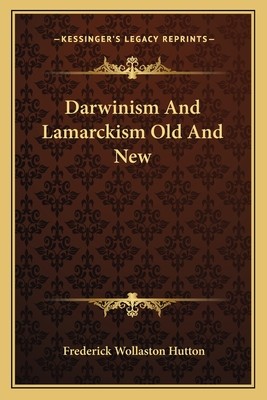
- We will send in 10–14 business days.
- Author: Frederick Wollaston Hutton
- Publisher: Kessinger Publishing
- ISBN-10: 1162943580
- ISBN-13: 9781162943589
- Format: 15.2 x 22.9 x 1.1 cm, minkšti viršeliai
- Language: English
- SAVE -10% with code: EXTRA
Reviews
Description
Purchase of this book includes free trial access to www.million-books.com where you can read more than a million books for free. This is an OCR edition with typos. Excerpt from book: LECTURE II THE NEW DARWINISM ELEVEN years ago I gave a lecture to the members of this Institute, in which I explained what was then understood as Darwinism; and I have now undertaken to try to explain the modern views held by Darwin's followers. Unfortunately it is a subject which, at the present time, is in a very confused condition, owing to the innumerable irrelevant issues that have been raised around it; but, when all the husk has been stripped off, the new Darwinism will be found to be a simple affair, easily understood. This confusion is largely due to its history; for the new Darwinism did not come upon us in a flash, as did the old, but has been gradually assuming shape for many years. In 1868 Moritz Wagner read a paper to the Royal Academy of Munich, in which he maintained that, without the separation of a few indi- 82 viduals from the rest of the species, natural selection could not act, and that these individuals must always have been isolated by geographical barriers. His thesis could not be upheld on either point, although it brought the importance of isolation prominently forward; and we may place the birth of the new Darwinism in November, 1886, when Dr. Romanes's first paper on physiological selection was published by the I/innean Society of London; for this contained a new idea. From that time it has gone on gaining coherence; and last year (1897) it received its latest development in the third part of Darwin and After Darwin, also the work of Dr. Romanes. This new Darwinism has not destroyed, or in the least damaged, the old. Indeed, it is not antagonistic to it in any way. It is merely an addition; but one of great value, for, as I shall explain at the end of the lecture, it enlarges much our conception of the great scheme of nature. The doc...
EXTRA 10 % discount with code: EXTRA
The promotion ends in 21d.17:49:20
The discount code is valid when purchasing from 10 €. Discounts do not stack.
- Author: Frederick Wollaston Hutton
- Publisher: Kessinger Publishing
- ISBN-10: 1162943580
- ISBN-13: 9781162943589
- Format: 15.2 x 22.9 x 1.1 cm, minkšti viršeliai
- Language: English English
Purchase of this book includes free trial access to www.million-books.com where you can read more than a million books for free. This is an OCR edition with typos. Excerpt from book: LECTURE II THE NEW DARWINISM ELEVEN years ago I gave a lecture to the members of this Institute, in which I explained what was then understood as Darwinism; and I have now undertaken to try to explain the modern views held by Darwin's followers. Unfortunately it is a subject which, at the present time, is in a very confused condition, owing to the innumerable irrelevant issues that have been raised around it; but, when all the husk has been stripped off, the new Darwinism will be found to be a simple affair, easily understood. This confusion is largely due to its history; for the new Darwinism did not come upon us in a flash, as did the old, but has been gradually assuming shape for many years. In 1868 Moritz Wagner read a paper to the Royal Academy of Munich, in which he maintained that, without the separation of a few indi- 82 viduals from the rest of the species, natural selection could not act, and that these individuals must always have been isolated by geographical barriers. His thesis could not be upheld on either point, although it brought the importance of isolation prominently forward; and we may place the birth of the new Darwinism in November, 1886, when Dr. Romanes's first paper on physiological selection was published by the I/innean Society of London; for this contained a new idea. From that time it has gone on gaining coherence; and last year (1897) it received its latest development in the third part of Darwin and After Darwin, also the work of Dr. Romanes. This new Darwinism has not destroyed, or in the least damaged, the old. Indeed, it is not antagonistic to it in any way. It is merely an addition; but one of great value, for, as I shall explain at the end of the lecture, it enlarges much our conception of the great scheme of nature. The doc...


Reviews